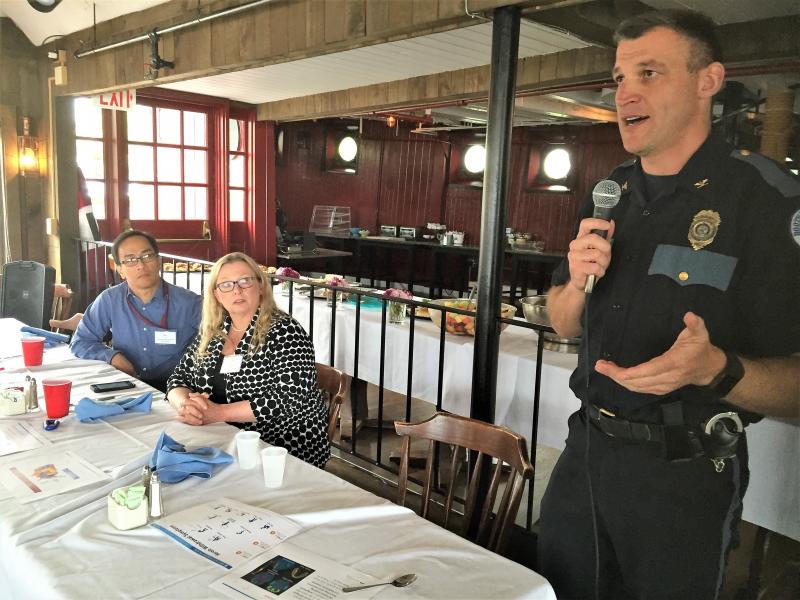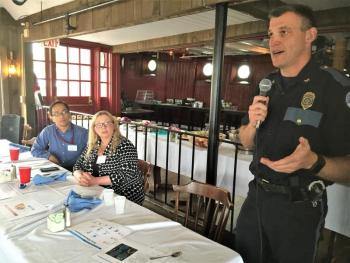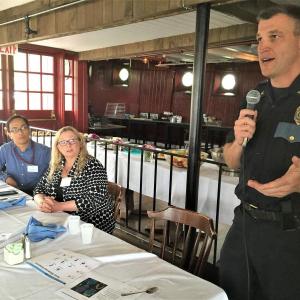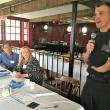Boothbay region’s IMAT collaborative: Leading the way in treating opiate use disorders and addictions
 At a community luncheon in May 2017 at the Tugboat Inn, Boothbay Harbor Police Chief Bob Hasch explains how local law enforcement recommends treatment for those battling addiction. At left is Dr. Aqui Alamo, sitting next to Holly Stover, program director for the Addiction Outreach Program. File photo
At a community luncheon in May 2017 at the Tugboat Inn, Boothbay Harbor Police Chief Bob Hasch explains how local law enforcement recommends treatment for those battling addiction. At left is Dr. Aqui Alamo, sitting next to Holly Stover, program director for the Addiction Outreach Program. File photo
 At a community luncheon in May 2017 at the Tugboat Inn, Boothbay Harbor Police Chief Bob Hasch explains how local law enforcement recommends treatment for those battling addiction. At left is Dr. Aqui Alamo, sitting next to Holly Stover, program director for the Addiction Outreach Program. File photo
At a community luncheon in May 2017 at the Tugboat Inn, Boothbay Harbor Police Chief Bob Hasch explains how local law enforcement recommends treatment for those battling addiction. At left is Dr. Aqui Alamo, sitting next to Holly Stover, program director for the Addiction Outreach Program. File photo
Nearly 15 years ago, Dr. Aqui Alamo was approached by colleagues who asked him to consider taking the necessary coursework to be able to prescribe Suboxone for people addicted to heroin or opioids. A pair of patients living in Boothbay were traveling to Portland each day to receive treatment, and the travel was taxing for the patients and their family members. Treatment needed to occur daily, and it was getting more difficult.
Like many, Dr. Alamo knew little about this new type of treatment at the time and was reluctant to take the course, partly because of the stigma associated with those who battle addiction. Today, as he reflects on his journey as a primary care practitioner at LincolnHealth’s Family Care Center in Boothbay Harbor, he is proud as he tells stories of patients who have returned to living meaningful, productive lives and who, over time, have come off Suboxone.
“As time went by and I learned more about substance abuse, I accepted the fact that it is a brain disease,’’ Alamo said. “It was difficult at first. To be honest, I didn’t want to touch this work with a 10-foot pole. But the best two decisions I’ve made in my career were moving to Boothbay and taking the courses so that I could help people with their addictions.”
Alamo was one of the first providers to offer these services in Lincoln County. Today, in the LincolnHealth system alone, seven providers are trained to provide Integrated Medication Assisted Treatment (IMAT), and patients can also enter treatment and begin it immediately if they are ready in the Emergency Department on the Miles campus.
Boothbay Harbor Police Chief Bob Hasch was on the front lines of this epidemic from the beginning. “I realized that just arresting people for drug-related crimes was not working and that addiction was not something that we could arrest our way out of,’’ he said. “There were also overdose deaths in the community that required that we change the way we look at this.” In a collaborative partnership with Boothbay Region Community Resource Council (BRCRC), Chief Hasch initiated the Addition Outreach Program in the summer of 2016.
“It is important to meet people where they are at,’’ said Holly Stover, who is the program director for the Addiction Outreach Program. “We are fortunate that the Boothbay region supported the creation of a collaborative that extends across our communities and believes that there is no wrong door into treatment.”
Along with the hiring of Dr. Cynthia Dechenes at the Family Care Center to expand opioid addiction recovery, treatment and support, the Boothbay region’s robust and rather unique collaborative has included the Addiction Outreach Program, the BRCRC and the Boothbay Harbor Police for more than three years.
The program follows the ‘Hub and Spoke’ model of recovery that research has proven effective. The ‘hub’ is the Addiction Recovery Center that delivers more intensive treatment and support to community members in their offices in Damariscotta and Brunswick.
Locally, the ‘spokes’ include the Family Care Center professionals, including integrated behavioral clinician Lisa Carbone, LCSW; the BRCRC, the Addiction Outreach Program the YMCA, police, clergy, the Amistad Peer Recovery Center and many others in the community. The ARC supports people in recovery accessing resources that promote sobriety closer to home when ready to do so.
Providing medication assistance, or Suboxone, is just one part of the program. IMAT includes talk therapy, connections to community resources that assist with other needs like health care, food and housing, and support groups so patients have the resources they need to focus on rebuilding their life and overcoming this powerful addiction.
“When you are addicted to opioids, you are always thinking about where to get the next fix,” Alamo said. “The Suboxone and additional treatment allows people to be functional – to hold a steady job and to be a part of their families. Over time, patients will reduce the amount of Suboxone they take until they no longer need it.”
When asked about the first two patients he treated more than a decade ago, Alamo’s face brightens.
“I see them all the time,’’ he said. “They’ve been off Suboxone and opioids for years, and they’ve gotten their lives straight and are really productive members of our community.”
“I tell all of my patients that once they have returned to sobriety, they are not off my list. If the monkey of addiction climbs back on the back, give us a call and we’ll be happy to help.”
How the Boothbay region’s IMAT collaborative works
Many people who are contemplating recovery can be intimidated by taking the first step, but once that step is taken in the Boothbay Region, a community dedicated to a person’s recovery can offer many types of supports that increase the chance of success.
Generally, this is how the Boothbay region’s IMAT collaborative works:
- A community member indicates that s/he is interested in exploring options for opiate/heroin recovery.
- The individual talks about recovery needs to: A family member; a friend; a medical provider, or others in the community including Holly Stover, Program Director, Addiction Outreach Program; Chief of Police Robert Hasch and the officers of the Boothbay Harbor Police Department; Lisa Carbone, LCSW at the Lincoln Medical Partners Family Care Center; a school guidance counselor, YMCA staff, peer support or a spiritual leader.
- First, counselors and case managers address needs for medical care, safety, food, clothing and shelter. They talk with the individual about recovery needs and s/he is introduced to members of the collaborative community team.
- The Addiction Outreach Program coordinates referrals to treatment, services and resources to meet the most basic unmet needs. The program also provides financial assistance for underinsured or uninsured people. This is supported through the generosity of community donors.
- The individual meets with ARC or Lisa Carbone, LCSW, to assess recovery needs while also connecting with a medical provider and accessing community-based support resources.
- The Family Care Center, is able to provide transportation assistance through a collaborative with a local cab company to and from medical, dental and recovery support services.
- When someone is underinsured or does not have health insurance, s/he is connected with the Opioid Health Home Patient Navigator, Care Partners or other appropriate medical care coverage resources.
- If a Family Care Center patient is not already acquainted, s/he is introduced to the Addiction Outreach Program, Community Navigator Services, recovery support groups, the YMCA, and may be assisted to access support through the local town offices when needed.
- The collaborative works with local business owners for employment opportunities.
- Connections are made with dental providers, including Lincoln County Dental and the local pharmacy to help people set themselves up for success toward their recovery goals.
- Funding is available to support IMAT patients’ medication needs through a collaborative between the BRCRC, the Boothbay Harbor Police Department and LincolnHealth’s Opioid Health Homes program.
- IMAT services are provided locally through the Lincoln Medical Partners Family Care Center
- We collaborate almost daily with many partners, including Stover, Chief Hasch, Community Navigators, the YMCA, the LincolnHealth Opioid Health Homes program, Coulombe Center for Health Improvement, Walgreen’s Pharmacy, Lincoln Dental, Riverside Cab Company, local churches and more.
For more information about IMAT or the Boothbay region’s ongoing collaborative to help people recover from opiate use disorders and addiction, please contact: Holly Stover, Addiction Outreach Program Director, 207-350-7477; Lisa Carbone, Integrated Behavioral Health Clinician, Lincoln Medical Partners Family Care Center, 207-633-7820 or the Boothbay Harbor Police Department, 207-633-5616. LincolnHealth also offers IMAT in Damariscotta and Waldoboro, for more information, please call 207-563-4747.
Event Date
Address
United States























